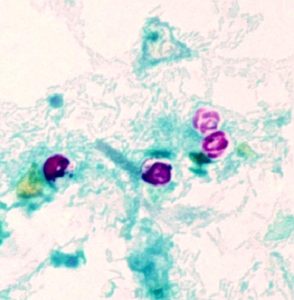The number of cases of the protozoan parasite, cryptosporidium, has increased more than 10-fold this summer in the Tampa Bay area compared to the same period last year, Hillsborough County health officials note in data released yesterday.

The total number of cases of the parasitic infection from the 5 area counties, Hillsborough, Pinellas, Pasco, Manatee and Polk, from June 1 to Aug. 18 was 226. This compares to the 21 cases reported during the same period in 2013. Pinellas County accounts for nearly half of the cases at 107.
The statewide total for that time frame is 465, meaning the Tampa Bay area accounts for nearly half of all “crypto” cases in Florida this year. And the bulk of that occurred during the summer months.
For example, from the beginning of the year to Aug. 18, the same 5 counties only recorded 268 cases while the state as a whole saw 645. From Jan. 1 to May 31 this year, the Tampa Bay area only saw 42 cases.
Health officials say since June 1, nearly 60 percent of cases of cryptosporidiosis in Hillsborough County were linked to exposure to a recreational water facility in the greater Tampa Bay area 2 weeks prior to onset of illness. In addition, the health department contacts the “exposure” facility to notify them and recommend prevention methods such as hyperchlorination of pools.
Cryptosporidium is a protozoan parasite (a tiny organism) that causes an infection called cryptosporidiosis affecting people and cattle.
The most common symptom is watery diarrhea, which can range from mild to severe. Although it’s most frequently seen in young children, cryptosporidium can affect anyone. People with weak immune systems are likely to be most seriously affected.
Cryptosporidium is found in soil, food, water, or surfaces that have been contaminated with infectedhuman or animal feces. Transmission occurs through animal-to-human or human-to-human contact. Consuming contaminated water or food, swimming in contaminated water and children visiting petting zoos are common ways people contract the parasite.
It is typically a self-limiting illness in otherwise healthy individuals. For more infectious disease news and information, visit and “like” the Infectious Disease News Facebook page
To help prevent Crypto, practice proper hand hygiene before preparing or eating food; after using the toilet; before and after tending to someone who is ill with diarrhea and after changing diapers. To keep swimming pools free from contamination, children and adults should not swim in a pool or enter a spa until at least two weeks after they have completely recovered from a diarrheal illness.
DOH recommends that parents and caregivers take these steps to avoid pool contamination:
- Take children on frequent bathroom breaks and check diapers often.
- Change diapers in a bathroom and not at the poolside as germs can spread to surfaces or objects in and around the pool and spread illness.
- Shower before entering the water.
- Wash their hands with soap and water after changing a child’s diaper.


2 thoughts on “Tampa Bay area has seen dramatic increase in ‘crypto’ cases this summer”